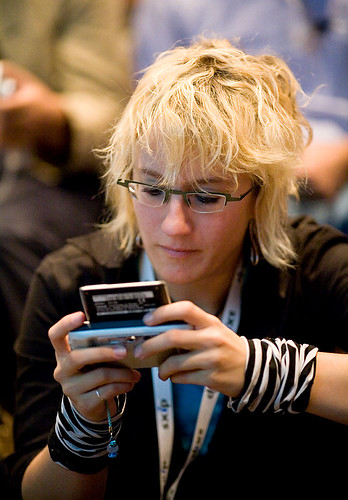 My friend danah boyd gave a talk at the Etech conference last month (link is here). I just got around to reading the speech which i thought was fantastic. She begins it….
My friend danah boyd gave a talk at the Etech conference last month (link is here). I just got around to reading the speech which i thought was fantastic. She begins it….
Isn’t there something magical about how fast the Internet went from a defense project to a key part of social infrastructure? Isn’t there something magical about how grandparents are blogging and activists are remixing popular TV shows to make social commentary? It is my belief that if we stare solely at the technology, we lose track of the true magic that exists around us.
What she does in the speech is break down how startups, corporations and almost anyone thinks
if you want to think about people, you need to understand how technological and corporate decisions interface with people’s lives and practices…
danah breaks down America’s society into stages and then describes the top 5 priorities of each stage, which are:
| Life Stage #1 | Life Stage #2 | Life Stage #3 | Life Stage #4 |
| * Friends | * Sex | * Labor | * Family |
| * Attention | * Friends | * Family | * Health |
| * Play/Leisure | * Money | * Money | * Religion |
| * Sex | * Play/Leisure | * Power | * Hobbies |
| * Consumption | * Labor | * Property | * Friends |
As someone who is moving from stage 2 to stage 3 (damn that’s scary) i see this switch happening. Friends are harder to get access to as work and relationships/marriage take a more important role in everyone’s life.
I like how she can switch from looking at behavior patterns to how corporations and startups behave and deliver products:
Startups typically are naive about people’s practices but utterly passionate about technology. If they’re lucky, their technology will reach the hands of a population for whom it will make complete sense. This population will morph their product to meet their needs. And if the startup is not stupid, it will support this morphing, learn from it, and seek to make more and more happy users. Companies typically try to model out demographics and design for the market that they think is most monetizable. They go straight for mass adoption based on need, not love. Even more so than startups, they tend to blow through their early adopters so that they can get to the cash-cow as fast as possible. Warning: once you destroy the trust of your early adopters, you’re on the greed path.
All in all, it’s a great speech and worth checking out if you’re at all interested in technology (even if you’re not technical).